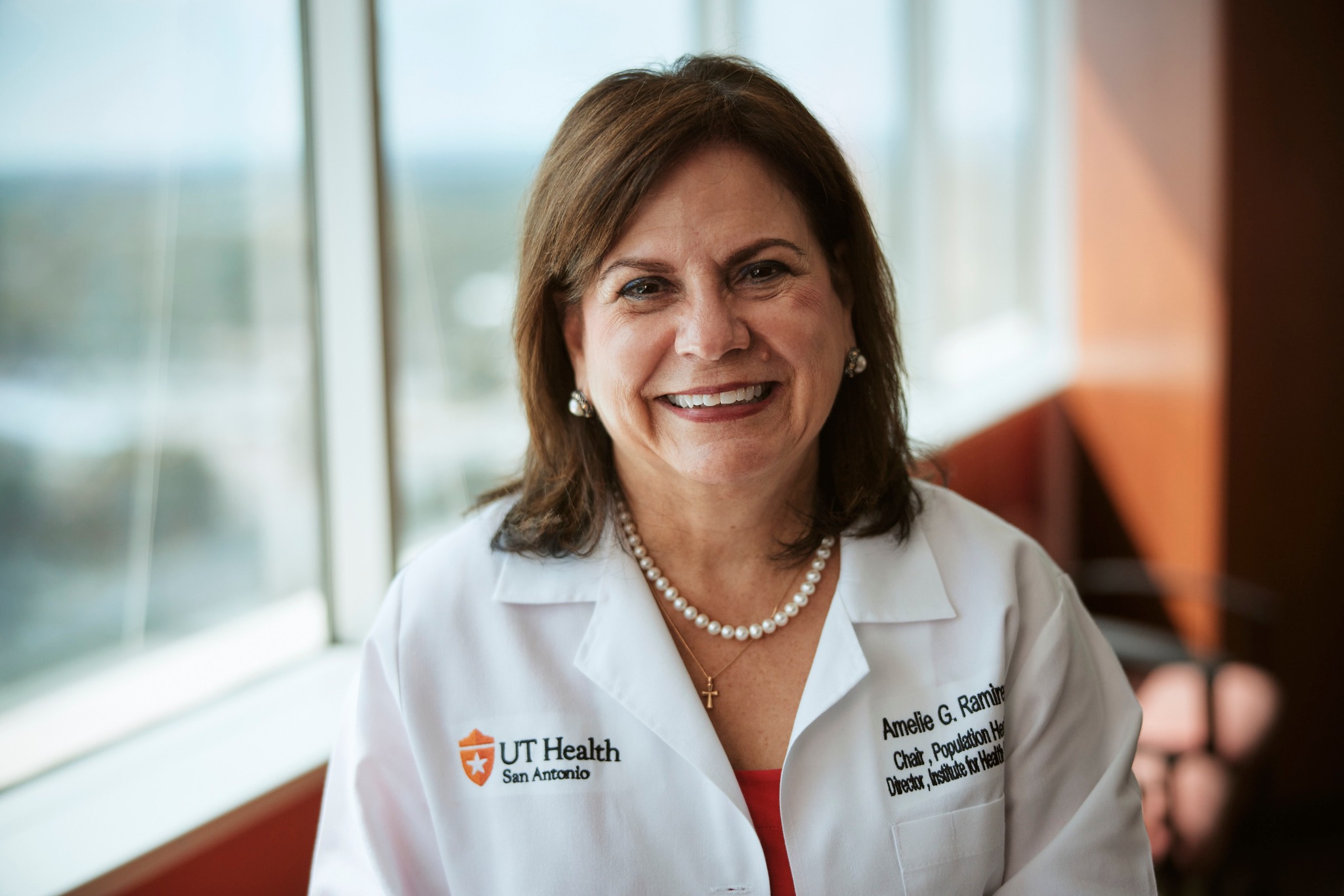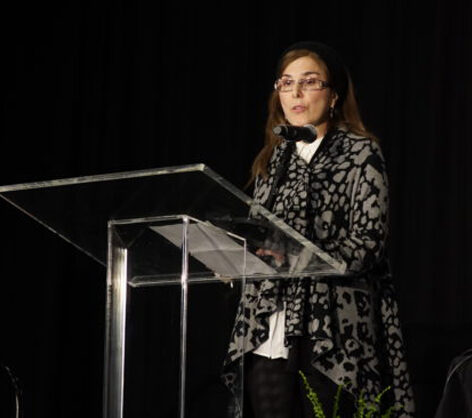
Share On Social!
You’re probably familiar with Valentine’s Day on February 14. Every year, couples dote on each other and exchange candy, roses, and other gifts.
But have you heard of Galentine’s Day? On February 13, Galentine’s Day is a time for women to celebrate their friendships with their gal pals, or lady friends.
In honor of Galentine’s Day 2023, Salud America! is highlighting the incredible work and friendship of Drs. Amelie Ramirez and Patricia Chalela, two Latina researchers at the Institute for Health Promotion Research (IHPR) at UT Health San Antonio.
The duo has a 30-year history working together to mitigate health inequities and disparities in the Latino community through public health research. Their contributions to Latino health equity are immeasurable.
Let’s take a look at their journey!
Who is Dr. Amelie Ramirez?
Dr. Amelie Ramirez is an internationally recognized researcher and director of Salud America! and its home base, the IHPR at UT Health San Antonio. She is also Chair of the Department of Population Health Sciences, and Associate Director of Cancer Outreach and Engagement at Mays Cancer Center at UT Health San Antonio.

Dr. Ramirez has spent more than 30 years reducing chronic disease and cancer health disparities affecting Latinos through human and organizational communication research.
She got her start in public health in her hometown of Laredo, Texas, while working for a health organization that focused on researching health needs in South Texas.
With a background in psychology, this job inspired Dr. Ramirez to “make a difference in people’s lives.” She went on to get a master’s degree in public health (MPH) to study health behaviors and motivate people to take better care of their health.
After completing her MPH, she began working in the Baylor College of Medicine, where she saw a need for communication and health disparity research.
“I also noticed a lack of health information offered in Spanish. These elements really influenced my decision to focus my career on helping Latinos live healthier lives,” Dr. Ramirez said.
She later got the opportunity to become a program coordinator for a new tobacco prevention project at the UT Health School of Public Health in Houston, which required her family to move to San Antonio, Texas.
As she grew in that position, her mentor encouraged her to think about getting a doctoral degree.
However, at that time, there were no public health doctoral programs being offered in the San Antonio area. The closest one was in Houston.
“I said, ‘OK, but how do I make it work? I live and work in San Antonio,’” Dr. Ramirez recalled. “My mentor worked with me to allow me to work full time while taking classes in Houston. I’m just grateful that Southwest Airlines had really cheap fares at the time. I would fly to Houston, take as many classes as I could in one day, fly home to San Antonio, and do my homework at night.”
Like a true super-woman, Dr. Ramirez continued working full time while raising a family and getting her doctorate degree. She was determined to make it work, and she did.
“It took me three years, but my husband and I worked it out, and it was it was the best thing that could have happened to me,” Dr. Ramirez said.
After years of conducting research, in 2006, Dr. Ramirez established the IHPR.
By that time, she had already been mentoring and working with Dr. Patricia Chalela for over 10 years.
Dr. Chalela would follow Dr. Ramirez to the IHPR (working remotely in Houston), where their friendship and professional accomplishments would continue to grow.
Who is Dr. Patricia Chalela?
Dr. Patricia Chalela is associate professor at the IHPR.

Born in Colombia to a Lebanese father and Colombian mother, Dr. Chalela and her family have always valued education.
After receiving her bachelor’s degree in community health in Colombia, Dr. Chalela studied community eye health in London.
“Once I studied community eye health, one of my first jobs when I came back to Colombia was the director of the Community Eye Health Department at an ophthalmic clinic that grew a lot and became a multidisciplinary hospital. Then I became the director of the Preventive Medicine Department over there,” Dr. Chalela said.
Then, in 1991, after doing a three-month long internship with the Pan American Health Organization, Dr. Chalela met Dr. Ramirez for the first time.
Dr. Chalela confided in Dr. Ramirez about how much she loved public health, and that she wanted to pursue a MPH.
Dr. Ramirez, who was working at the South Texas Health Research Center at the time, encouraged Dr. Chalela to pursue her dreams.
“I guess she saw something in me,” Dr. Chalela said. “She welcomed me, motivated me, and supported my academic goals. Her team members were always caring and supportive. That made a big difference for me. With her mentorship, I completed my MPH and my doctoral degree focusing on health promotion and epidemiology.”
Upon completion of her doctorate degree, Dr. Chalela joined Dr. Ramirez at Baylor College of Medicine working on health communication and health disparities research.
Then, Dr. Ramirez and her team moved to the IHPR, where Dr. Chalela would become an accomplished scientist.
“All that would not have been possible without the support and trust of Dr. Ramirez,” Dr. Chalela said.
Two Gals Join Forces to Improve Latino Health
Since the launch of the IHPR in 2006, Drs. Ramirez and Chalela have continued to conduct collaborative research to reduce Latino health disparities.
Their research projects have included the Quitxt text-message smoking cessation service, with the support of the Cancer Prevention and Research Institute of Texas; a mobile app to help breast cancer patients stick with endocrine hormonal therapy; recruiting more Latinos into clinical trials, funded by Genentech; improving Latina breast cancer survivors’ physical, mental, and spiritual well-being, thanks to a grant from Susan G. Komen; and unpacking the social, cultural, behavioral, mental, biological, and medical influences on Latino post-cancer life through the Avanzando Caminos study, funded by the National Cancer Institute.
In addition to research, Drs. Ramirez and Chalela are both strong advocates for supporting the next generation of Latino researchers.
Dr. Ramirez leads the National Cancer Institute-funded Éxito! training program to help master’s-level students and professionals pursue a doctoral degree and cancer research career. Of 226 Éxito! trainees since 2011, over 33% have enrolled in or graduated from a doctoral program.
“We work hard to enable Latinos take the next steps from a master’s degree to get their doctoral degree and focus on careers in Latino cancer research and prevention,” Dr. Ramirez said.
Dr. Chalela is the associate director for community education and training and is leading the internship program at IHPR. Through the program she has mentored more than 50 graduate and undergraduate students and has routinely brought students into her projects, providing an invaluable learning environment for them.
“Mentoring students and young colleagues has been very rewarding to me. They are bright and passionate. I was where they are a few years back. I really like trying to guide them and help them develop the skills needed to become high-quality professionals,” Dr. Chalela said.
Uplifting Each Other
As a result of this incredible work, Dr. Ramirez was recently named a “Cycle Breaker” by TV personality Oprah Winfrey.
Cycle Breakers is a video series from the Smithsonian Channel that spotlights leaders who are solving health disparities in marginalized communities. Each Cycle Breaker is chosen by Oprah to augment her documentary, The Color of Care, which chronicles how people of color suffer from systemically substandard US healthcare and how COVID-19 exposed the tragic consequences of this inequity.
Ramirez’s episode, released Oct. 3, 2022, features her life’s work to break the cycles of inequities that worsen health for Latinos.
“The work that you’re doing to make real change and help correct disparities in our healthcare system is invaluable,” Oprah said in a message for Dr. Ramirez. “I admire your mission and your purpose to do better … I hope you feel empowered now to continue on your path to helping communities take the right step, the right next step, to begin to make a difference.”
Dr. Chalela has also been recognized for her contributions to the IHPR, especially for developing and testing innovative technologies to reduce health disparities.
She was recently awarded an American Cancer Society Research Scholar Grant to improve medication adherence among Latina breast cancer patients and has also submitted a research proposal to the Cancer Prevention & Research Institute of Texas to expand the Quitxt program.
A Friendship to Last a Lifetime
Both Drs. Ramirez and Chalela are proud of each other’s accomplishments.

They both appreciate the opportunity to improve lives by designing, implementing, evaluating, and disseminating evidence-based interventions to reduce health disparities.
Together, they are a driving force for promoting health equity among Latinos and other underrepresented population groups.
“I’m proud to be part of a team of researchers led by Dr. Amelie Ramirez,” Dr. Chalela said. “Dr. Ramirez and I are committed to investigating the causes of health inequities among Latinos in South Texas and throughout the nation and using our skills to create sustainable change.”
“I’m grateful to be part of Dr. Chalela’s career journey and stand by her as a supportive friend and colleague,” Dr. Ramirez said. “We both look forward to more opportunities to work together to improve Latino health.”
Explore More:
Health EquityBy The Numbers
142
Percent
Expected rise in Latino cancer cases in coming years
This success story was produced by Salud America! with support from the Robert Wood Johnson Foundation.
The stories are intended for educational and informative purposes. References to specific policymakers, individuals, schools, policies, or companies have been included solely to advance these purposes and do not constitute an endorsement, sponsorship, or recommendation. Stories are based on and told by real community members and are the opinions and views of the individuals whose stories are told. Organization and activities described were not supported by Salud America! or the Robert Wood Johnson Foundation and do not necessarily represent the views of Salud America! or the Robert Wood Johnson Foundation.



